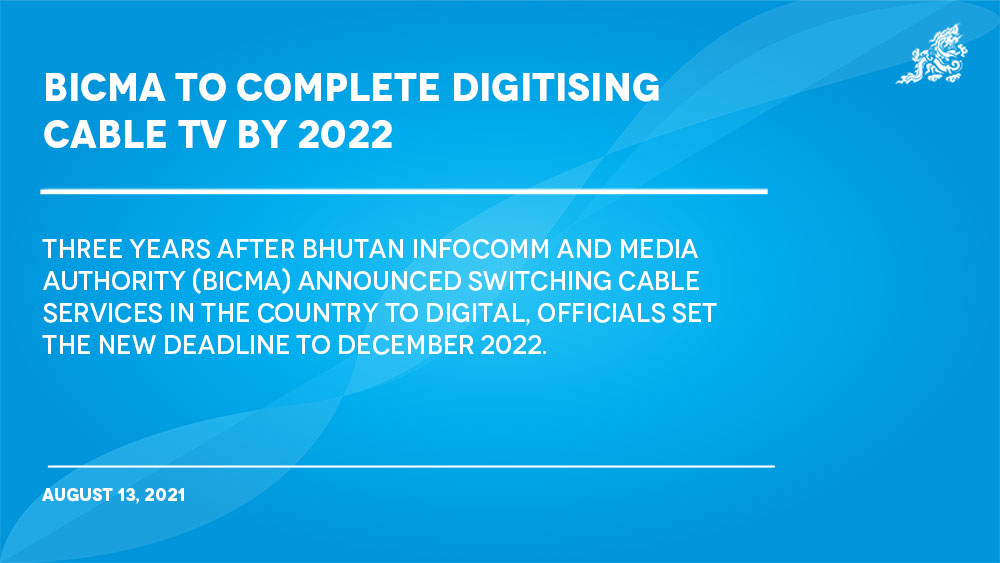Chhimi Dema
Three years after Bhutan InfoComm and Media Authority (BICMA) announced switching cable services in the country to digital, officials set the new deadline to December 2022.
BICMA, as the regulatory body responsible for licensing and enforcement of cable television in the country, decided to digitalise cable services to encourage technology enhancement, provide better customer services and ensure accountability.
Officials cited challenges of importing equipment because of the pandemic, lack of expertise in the field and reluctance to switch to digital TV in the rural areas for the delay in digitisation.
BICMA’s director, Jigme Wangdi, said that digital cable TV was started to improve the quality of service.
He said digitisation is also expected to help in acquiring the exact number of television users in the country. “Every TV would have a set-up box. This data is important because it allows what policy intervention is required and avoids tax evasion.”
According to the director, the digitisation service would help authorities convey information during disasters. “Everyone in the country will also have uniform channels.”
BICMA issued a notification stating it will not provide licences for new cable television operators this May.
According to a notification, licensing of new cable television (CATV) operators in the country was suspended until all the existing cable operators are fully digitalised.
It stated that until all the CATV operators in the country are digitised and interconnected with its multi-service operator, it is difficult for the authority to establish this requirement since the actual number of subscribers covered by the CATV operator cannot be fully validated.
However, the notification states that BICMA would make exceptions for applications to cover areas that have not been covered by any cable TV operators.
There are 96 cable operators in the country and two multi-service operators (MSO).
MSO is the television content distributor that receives television broadcasting services from broadcasters and sends the signals to cable TV operators.
Jigme Wangdi said that BICMA’s mandate is to foster healthy business competition that provides quality service to the consumers.
“Just because there is one service provider, it does not mean that there should be two or three service providers to promote competition,” he said, adding that service providers have to give quality service and ensure sustainable business.
NetCom Bhutan, a multi-service provider, has connected more than 60 operators with their signal.
An official from NetCom Bhutan said that there were challenges such as high-cost digital migration and the cost of distributing the signal to remote areas slowing the digitalisation of the cable TV industry.
“Migrating from analogue to digital system needs a lot of investment especially for operators in remote areas who do not have a big customer base,” the official said. “Buying digital equipment for their control room and for their subscribers has challenged them financially to get the digital signal from the MSO.”
Another challenge that impedes the transition from analogue to digital cable TV service was the high cost of distributing signals to remote areas.
The official said that the lack of access to national optic fibre makes it more challenging to reach the signal to rural pockets.
NetCom Bhutan subscribes to telecom’s bandwidth services to distribute the signal.
Druk MSO’s promoter, Sherub Lhamo, said it is important that BICMA implements the notification strictly.
Edited by Tashi Dema


